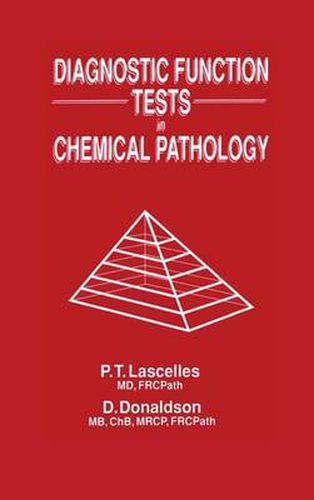Readings Newsletter
Become a Readings Member to make your shopping experience even easier.
Sign in or sign up for free!
You’re not far away from qualifying for FREE standard shipping within Australia
You’ve qualified for FREE standard shipping within Australia
The cart is loading…






This title is printed to order. This book may have been self-published. If so, we cannot guarantee the quality of the content. In the main most books will have gone through the editing process however some may not. We therefore suggest that you be aware of this before ordering this book. If in doubt check either the author or publisher’s details as we are unable to accept any returns unless they are faulty. Please contact us if you have any questions.
This book is written for hospital doctors, nurses, biochemists, medi cal laboratory scientific officers and phlebotomists involved with the biochemical investigation of patients. It is hoped, also, that general practitioners and medical students will find it of help. Whilst the vast majority of biochemical tests assess the level of constituents in blood and urine at a given point in time, an impor tant additional parameter is the assessment of physiological reserve function by means of loading tests, prOlonged fasting, exercise and clearance studies. The protocol and interpretation of response of each of these stress tests form the main basis of the text. An attempt has been made to be reasonably comprehensive in the range of tests described; hence, not only have some rather older ones been re tained, but also some very recently introduced ones included. It is appreciated that practice varies widely from laboratory to labora tory with respect to protocol, sample collection, methodology and quotation of reference ranges, and no doubt also from clinician to clinician, particularly regarding interpretation of results. In paedi atric work, micromethods will demand much smaller volumes of blood than those stated here, which relate generally to adult medi cine. The account, therefore, must be seen as a guide to practice rather than as a recipe; it is in no wayan attempt to standardise procedures, which depend on the local requirements.
$9.00 standard shipping within Australia
FREE standard shipping within Australia for orders over $100.00
Express & International shipping calculated at checkout
Stock availability can be subject to change without notice. We recommend calling the shop or contacting our online team to check availability of low stock items. Please see our Shopping Online page for more details.
This title is printed to order. This book may have been self-published. If so, we cannot guarantee the quality of the content. In the main most books will have gone through the editing process however some may not. We therefore suggest that you be aware of this before ordering this book. If in doubt check either the author or publisher’s details as we are unable to accept any returns unless they are faulty. Please contact us if you have any questions.
This book is written for hospital doctors, nurses, biochemists, medi cal laboratory scientific officers and phlebotomists involved with the biochemical investigation of patients. It is hoped, also, that general practitioners and medical students will find it of help. Whilst the vast majority of biochemical tests assess the level of constituents in blood and urine at a given point in time, an impor tant additional parameter is the assessment of physiological reserve function by means of loading tests, prOlonged fasting, exercise and clearance studies. The protocol and interpretation of response of each of these stress tests form the main basis of the text. An attempt has been made to be reasonably comprehensive in the range of tests described; hence, not only have some rather older ones been re tained, but also some very recently introduced ones included. It is appreciated that practice varies widely from laboratory to labora tory with respect to protocol, sample collection, methodology and quotation of reference ranges, and no doubt also from clinician to clinician, particularly regarding interpretation of results. In paedi atric work, micromethods will demand much smaller volumes of blood than those stated here, which relate generally to adult medi cine. The account, therefore, must be seen as a guide to practice rather than as a recipe; it is in no wayan attempt to standardise procedures, which depend on the local requirements.